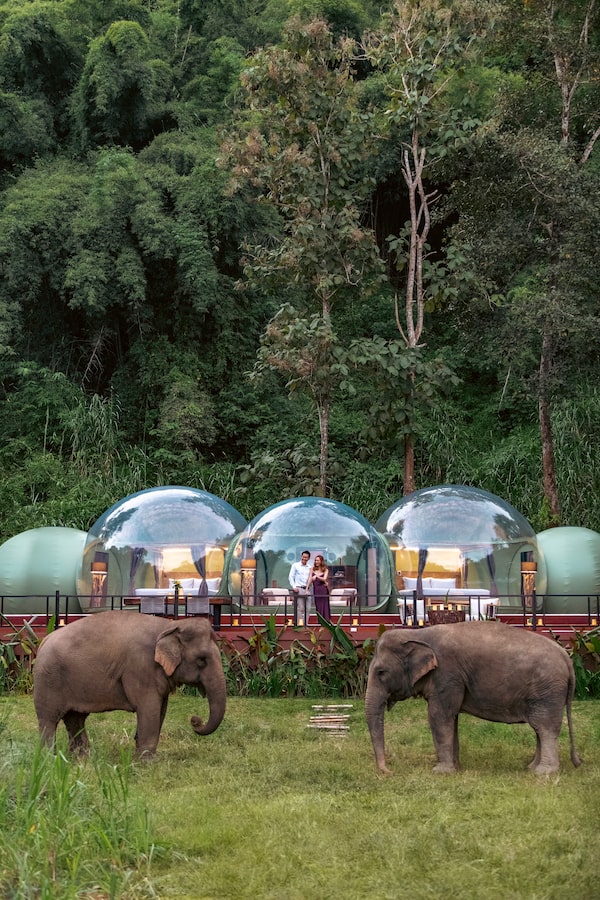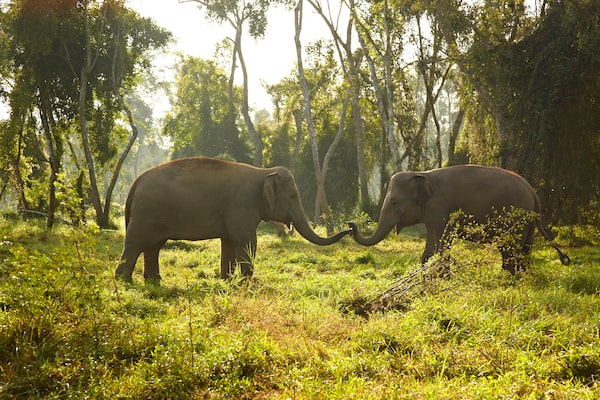Twenty elephants supported through the Golden Triangle Asian Elephant Foundation (GTAEF) roam 160 acres of lush land at the Anantara Golden Triangle Elephant Camp and Resort.Alanna Smith/The Globe and Mail
As the sun rises and a thick mist settles below the jungle canopy in the northern city of Chiang Rai in Thailand, elephants rescued from illegal logging camps, city streets and tourism parks can be heard trumpeting, adding to an outdoor orchestra of birds singing and insects chirping.
Twenty elephants supported through the Golden Triangle Asian Elephant Foundation (GTAEF) roam 160 acres of lush land at the Anantara Golden Triangle Elephant Camp and Resort. The land is described as an “elephant buffet” with sweet figs and various plants along the Mekong River. Seven of the elephants were taken in when Thailand closed its borders during the pandemic and tourism dollars dried up, leaving owners unable to feed or care for them in bankrupt camps.
The toll of these past lives is still visible in elephants like Benz, a 17-year-old female rescued in 2022, seen bobbing her head and swaying side-to-side on a warm January morning before being fed treats by resort guests. Head veterinarian Nissa Mututanont said it’s a habit typical of elephants that were shackled to short chains.
In this new environment, on the luxury hotel’s property, it’s possible for the elephants to ease into a life of comfort away from the underbelly of elephant tourism in Thailand. The foundation also provides the same opportunity for their skilled caregivers, called mahouts, by renting their elephants for roughly 25,000 Thai Baht per month (roughly $250) and providing sustainable work. The cost of living is covered for mahouts, and their families, if they choose to stay on-site to care for their elephants.
On the luxury hotel’s property, it’s possible for the elephants to ease into a life of comfort away from the underbelly of elephant tourism in Thailand.Supplied
Anantara’s hotel guests benefit too, since it means they can join the large mammals as they trek, feed and bathe.
The Anantara resort is perched on a jungle ridge that overlooks the Thailand border with Laos and Myanmar. Its 61 rooms and suites are elegant but rustic with teak furnishings, Thai artwork, and pillowcases and bed throws made with fabric from nearby villages. Private balconies and the resort’s infinity pool give way to expansive views of the misty jungle and guests can lounge in the lavish Elephant Bar before dining in one of the resort’s restaurants or privately in a terraced rice paddy.
But many guests are here to hang out with the elephants. Some will book the transparent Jungle Bubbles, complete with an outdoor deck and plunge pool, for uninterrupted views of beasts roaming the grasslands and to see the stars at night. Most guests though, head to the Elephant Camp. Groups of up to eight people joined by the mahouts and a vet can fall into slow pace with the giants as they pick up long blades of grass with their trunks and curl the food into their mouth, rub their leather-like skin against trees to relieve an itch or submerge themselves in the nearby river.

Couples can book the transparent Jungle Bubbles, complete with an outdoor deck and plunge pool, for uninterrupted views of elephants roaming the grasslands and to see the stars at night.Supplied
In another part of the camp, guests prepare and serve the elephants medicinal treats, kneading together sweet potatoes, bananas, sticky rice, pellets and rice husk into balls that are stuffed with tamarind. The elephants wait not-so-patiently behind a wooden barrier, and long trunks creep under the straw-covered preparation station to grab the tasty balls, sometimes three or four at once.
Guests run their hands along their wrinkled skin, looking directly into the eyes of one of Thailand’s most revered animals, celebrated for its strength and power. The elephant is a sacred symbol in Buddhism, the country’s main religion, and has played a significant role in Thailand’s trade, labour and tourism industries and even as an instrument of war in centuries past.
But, while wild elephants are protected by national laws, captive elephants can still be traded, bred and used for commercial purposes, some abused in the process. John Roberts, group director of sustainability and conservation for Anantara, said it’s places like the Anantara Elephant Camp that prove ethical tourism is the better way forward and that people are enthusiastic about the marriage of luxury and conservation. The cost of staying at the resort supports the elephants.
At Anantara, the elephant experiences are only open to hotel guests, either by booking visits separately (around $200, or up to $375 for one-on-one) or by choosing an all-inclusive package that includes one elephant activity (or other resort experience) per night of their stay; this starts at $1,894 per night.
Roberts, who formerly held the title “head of elephants,” joined Anantara in 2002, having already spent years working with elephants in Nepal and Thailand as a conservation specialist.
The resort began by renting the animals from the government but soon realized that elephants on the street were in much greater need. The organization then began buying overworked street elephants from mahouts before being faced with the grim reality that it only intensified the problem with money being used to purchase more elephants, driving forward a market that increased the captive population.

Twice a year, the Anantara elephants are treated to a celebratory buffet of sweet fruits, such as watermelon and pineapple, and vegetables, such as pumpkins and corn.Markus Gortz/Supplied
Having a drink in a busy Bangkok bar in the mid-2000s, Roberts watched an elephant walk past and another idea sparked – rentals. He sprung out of his seat and tried to persuade the mahout to rent his elephant, Pleum. It didn’t work at first but he persisted, eventually persuading the man it was a good deal, one that benefitted both him and his animal. “That ended up being the model for all the other deals,” he said.
In the beginning, he described finding elephants as a whirlwind endeavour, searching the busy capital city for street giants and gaining trust with mahouts who, at that time, would resell sugar cane to tourists to feed their elephants. These gentle giants were sleeping under overpasses and supermarket parking lots with the city roaring around them. Clean water wasn’t easy to find and the psychological trauma was “possibly worse than anything else,” said Roberts.
But he said the operation has come a long way since the first rescue. “The first two COVID refugees – Thong Inn and Kam Mool – were agreed over a socially distanced meeting in a Starbucks car park over takeout coffee and doughnuts,” said Roberts.
Nissa, the resort’s vet, said mahouts now reach out directly to the organization, unable to afford the US$15,000 cost to care for their elephant yearly, or the resort is tipped off from mahouts who are already at Anantara about good additions to the program. She said another goal of the foundation is to preserve the fading tradition of mahouts by providing education and English lessons to children who are descendants of elephant keepers so that they can continue their work and interact with people from across the globe.
Some mahouts “claim that they’re born on an elephant’s back,” said Nissa, describing how close the bond is between human and animal. In fact, some mahouts don’t even need to speak commands, just a tap on their elephant’s leg will do. Only positive reinforcement training is allowed at Anantara, explains Poonyawee Srisantear, Elephant Camp manager. Elephant welfare is of the utmost importance, he said.
The mahouts at Anantara walk alongside their elephant for hours, feeding them fruit that’s fallen into the grass, dipping with them into the water to cool off in the afternoon sun and napping by their side in the shade of tall trees.
And then twice a year, on National Thai Elephant Day (March 13) and World Elephant Day (Aug. 12), the Anantara elephants are treated to a celebratory buffet of sweet fruits, such as watermelon and pineapple, and vegetables, such as pumpkins and corn. Srisantear said some prefer sweet over sour and the more sneaky giants quickly grab their favourite goodies to stock a personal pile beside them.
During a visit in January, the ears of some elephants waved front to back in perfect rhythm with their tails moving side to side. Nissa said it’s an elephant’s version of a smile.
If you go
Canadians can fly into Bangkok’s Suvarnabhumi Airport, but you’ll need to take another (but much shorter) flight to reach the Mae Fah Luang - Chiang Rai International Airport. Airport transfers are arranged for guests of Anantara who book the all-inclusive package, otherwise it will take about an hour by taxi from Chiang Rai International.
The writer was a guest of Anantara Hotels. It did not review or approve the story before publication.